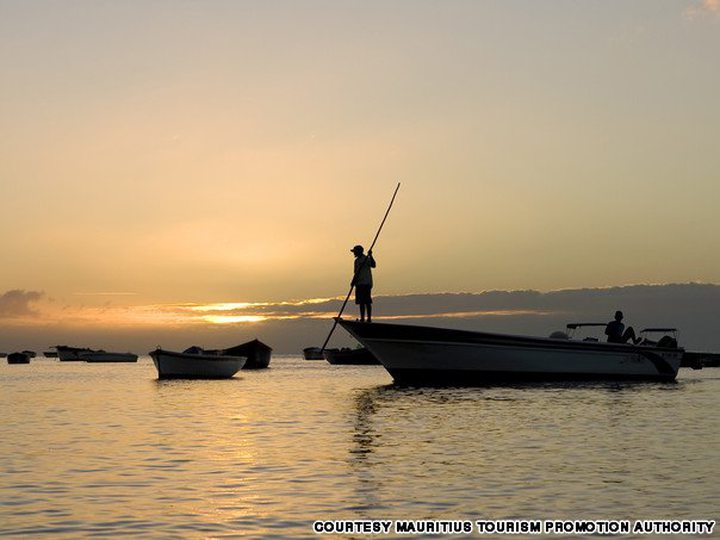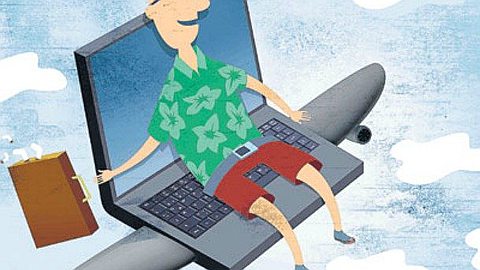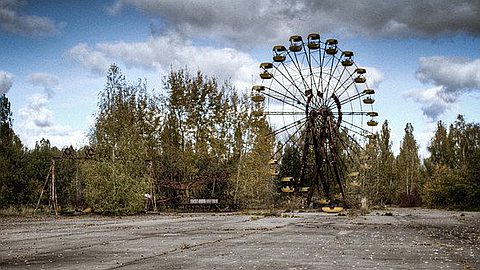Could Mauritius’ ‘Ocean Economy’ Be The Future For Island States?

My speedboat sets off at dawn, cutting through the calm waters of Mauritius’ turquoise lagoon.
Ten minutes and a few kilometers later, we sight the fins of spinner dolphins jumping through the water, the sounds of their blowholes punctuating the silence.
I snorkel with about 50 of them, swimming side by side underwater.
By the time I resurface, six other boats have arrived full of snorkel-clad tourists ready to jump in.
Mauritius’ marine tourism industry, it seems, is very much alive and so far it doesn’t encroach on the dolphins’ habitat too much.
But there are plans to make it a lot bigger.
Tourist influence
Mauritius’ tourism sector has developed over the past decade and now plays a major role in the country’s growth -- it’s the third pillar of its economy, after agriculture and manufacturing.
According to government figures, tourism made up 11% of the country’s total GDP in 2000 when tourism arrivals hovered around 660,000. By 2011, arrivals rose to 965,000.
However, the industry appears to be slowing down in the wake of the global economic crisis.
Official estimates claim arrivals will reach 980,000 by the end of this year, representing just a 1.5% increase from last year -- worrying for an island nation accustomed to tourism growth of around 6% in years past.
It’s therefore timely that the government of Mauritius has an ambitious proposal up its sleeve.
Prime Minister Dr. Navinchandra Ramgoolam announced in July a plan to create an “ocean economy” that would tap into the potential of its vast waters -- the island’s Exclusive Economic Zone (EEZ) measures almost 2.4 million square kilometers.
This will diversify the economy and protect it from future external blows, as well as drive growth, he says.
What is an 'ocean economy'?
“The Mauritian government wishes to promote the ocean economy as one of the new pillars of its economic development,” says Milan Meetarbhan, ambassador of Mauritius to the United Nations.
“One of the main objectives is to create jobs for future generations. There would also be new avenues of growth in already established industries.”
According to Meetarbhan, the ocean contributed almost 11.5% of GDP in 2011, an indication of how significant the ocean economy could become.
So what exactly does an “ocean economy” consist of?
Marine pharmaceuticals are one area that would benefit.
“Thus far we have been keeping an inventory of just one marine organism in our waters, the marine sponges, but we know there are around seven to eight marine organisms that can be sources for marine drugs,” says Dr. Daniel Marie, officer-in-charge at the Mauritius Oceanography Institute (MOI), which is spearheading the research and strategic planning for the new plan.
Marine sponges have potential in the search for cancer drugs.
“We have been testing our extracts on human cancerous lines and getting some good results. The potential is huge here,” Dr. Marie explains.
Business opportunities are also expected to develop under an ocean economy, organized into five clusters: marine services (marine tourism and marine pharmaceuticals); petroleum, minerals and ocean energies; fisheries and aquaculture; seaport related activities; and deep ocean water applications (DOWA), which include a plan to pump cold water of approximately 5 C from depths of around 1,000 meters to the surface to cool buildings.
The water is returned to the ocean at 11 C.
Sotravic, a private Mauritian company eyeing this opportunity, predicts that the DOWA network could reduce CO2 emissions by almost 100,000 metric tons per year through electricity savings.
Currently, a draft of the ocean economy road map has been drawn up identifying lucrative avenues and the way forward, with a finalized version due in October.
Where do dolphins fit in?
While I’m submerged in the Indian Ocean, surrounded by dolphins, I wonder if the new plan is good for the dolphins.
If marine tourism is scaled upward, would more tourists harass the creatures?
How will these beautiful mammals and the other creatures of the sea co-exist with the government’s grand proposal?
“We believe the health of the ocean economy will depend on the health of the ocean," says Meetarbhan. "Developing an ocean economy is a long-term process and we have to ensure that our approach is a sustainable one.”
Mauritius has ratified the United Nations Convention on the Law of the Sea (UNCLOS), which was introduced in 1994, obliging the island to protect and preserve its marine environment.
Currently, the MOI is also overlooking two projects that aim to enhance the health of Mauritius’ waters and shores.
Ongoing projects
The first is coral farming and restoration. According to Dr. Marie, only 20% of Mauritius’ coral cover remains intact and the rest has been destroyed by a combination of human factors and climate change.
The second project is monitoring and studying coastal erosion to invent sustainable solutions.
“We are also carrying out baseline surveys of what we have right now so that when these projects come into operation, such as the DOWA, we can monitor any changes to the environment and marine life,” says Dr. Marie.
In terms of marine tourism, a government-regulated system would, in fact, be better, says Dr. Marie.
Once that industry is bought under the scrutiny of the ocean economy, rules can be drawn up and enforced, such as the number of people allowed to go dolphin swimming at any one time, the distance the boats should maintain and the type of boats that should be used for these activities.
As I bid adieu to the school of dolphins and clamber back onto my speedboat, I hope he’s right and that Mauritius can inspire other island nations to use and protect their most valuable asset -- the ocean.



